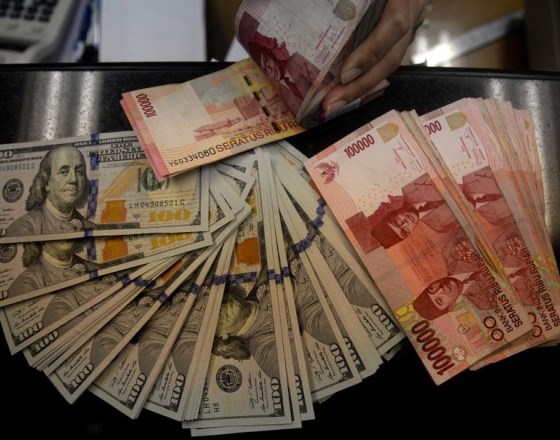
Singapore. Indonesia's rupiah hit a six-week low on Wednesday after the central bank eased policy by boosting banks' lending power, with most emerging Asian currencies sliding on mounting expectations that the US Federal Reserve will raise interest rates next month.
The Chinese yuan fell to its lowest in more than two months as the US dollar touched a seven-month high against a basket of major currencies and the central bank set its midpoint weaker.
The rupiah eased 0.2 percent to 13,775 per dollar, its weakest since Oct 8. The Indonesian currency came under further pressure from dollar demand from importers.
Bank Indonesia on Tuesday cut a reserve requirement, while leaving its benchmark interest rate unchanged. The central bank said it sees some room to ease monetary policy further.
Yet, fears of capital outflows on potential US tightening were expected to limit its abilities to lower the policy rate to prop up Southeast Asia's largest economy, analysts said.
"BI will likely cut interest rates after the Fed hikes and they see that IDR is stable. That would be more towards Q2," said Sean Yokota, head of Asia strategy for Scandinavian bank SEB in Singapore.
Yokota expected the rupiah to weaken to 14,700 by the end of this year and to depreciate to as low as 15,500 in 2016. In September, the Indonesian currency hit 14,730, its weakest since July 1998.
The rupiah was the second-worst performing Asian currency so far this year, losing 10 percent against the dollar. The rupiah was regarded as more vulnerable to the Fed's tightening due to Indonesia's current account deficit and fiscal shortfall.
Bank Indonesia holds the next policy meeting on Dec. 17, hours after the Fed announces its decision on interest rates.
The US central bank is widely expected to raise rates for the first time in nearly a decade.
"If, as we now expect, the US Fed were to raise rate in December and signal a 25 bps hike in every quarter next year, BI is unlikely to deliver a rate cut in December," DBS said in a client note.
"BI rate may remain steady at 7.50 percent for quite some time."
Lows since early October
Most other emerging Asian currencies hit their lowest levels since early October as solid US economic data such as October consumer prices indicators supported the case for the Fed's December liftoff.
The South Korean won fell 0.4 percent to 1,175.0 per dollar, its weakest since Oct. 2, as foreign investors continued to sell Seoul shares. Dollar demand from state-run companies also weighed on the local currency.
Thailand's baht eased 0.3 percent to 36.07 per dollar, its softest since Oct. 8, as foreigners sold Thai stocks and bonds.
The Malaysian ringgit slipped 0.2 percent to 4.3940 versus the greenback, its weakest since Oct. 5, as low commodity prices underscored concerns over the country's gas and raw material exports.
Singapore's dollar touched 1.4265 per the US dollar, its weakest since Oct. 6, tracking the yuan's weakness.
The city-state's currency closely follows the Chinese unit as traders and analysts believe it is included in the undisclosed currency basket used by Singapore's central bank to manage monetary policy.
original source: http://jakartaglobe.beritasatu.com/business/rupiah-6-week-low-c-bank-easing-asia-fx/
